Oil Generals
Zhakyp Marabayev: «Kashagan Will Work for the Benefit of Future Generations»
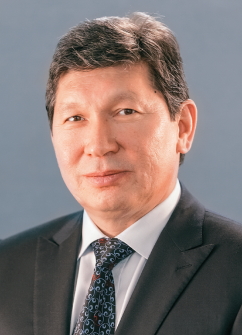
Petroleum continues its cycle of interviews “Generals”, with people who were present at the establishment of the oil and gas sector in sovereign Kazakhstan, people who, in terms of the status and authority they enjoy among their colleagues, can rightfully be called “oil generals”. Among those to whom this term can be applied in full is, in spite of his age, today’s guest.
He is just 50, and in 1993, when, along with Kadyr Baikenov and Baltabek Kuandykov, he was included by the head of state in the process of organizing the international consortium to carry out prospecting work in the Caspian Sea, he was just 31. In 1997 he was given the medal “For special services” by the president for this work, and was later awarded the order of “Kurmet”. Zhakyp Marabayev now works as deputy managing director of the company NCOC, and on the eve of the launch of commercial production at Kashagan he recalls how it all began.
Zhakyp Nasibkalieyvich, it can be said that you have taken part in the development of the Caspian shelf since the very first day. How and under what circumstances did the idea emerge of looking for oil offshore?
Before answering that question I should point out that the future oil and gas reserves of the Caspian shelf had been predicted by Soviet geologists. For example, extraction at the Azerbaijani offshore field Neftyanyye Kamni had been under way since 1949. The most serious efforts to develop the Caspian shelf began during the Soviet period in the mid-1980s. At that time prospecting for oil in the Caspian was carried out mainly in the section between Azerbaijan and Turkmenistan, which was considered the most promising. Most of the oilfields opened at that time are concentrated in this area.
The northern and central parts of the bed of the Caspian, currently adjoining Russia and Kazakhstan, had not been explored very much, although there was a lot of data indicating that quite large oil deposits could be hidden there. Historically, during the Soviet period Russia and Azerbaijan held the leading positions in the oil industry in the Caspian, so it is no accident that offshore prospecting operations were primarily carried out by these two republics. Their enterprises carried out geophysical exploration and drilling work, including on the Kazakh shelf. Kazakh oil specialists, of course, took part in these operations, but did not have leading roles.
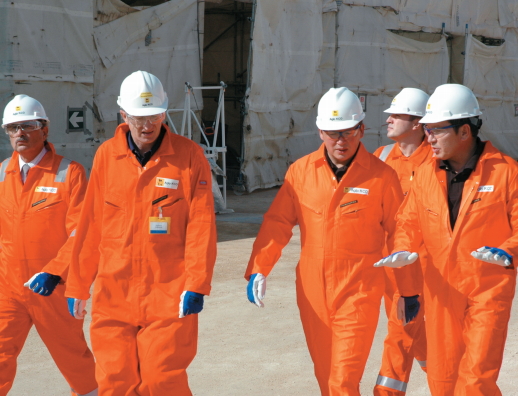 During a visit of KazMunaiGas management to D-island, September, 2009
During a visit of KazMunaiGas management to D-island, September, 2009As regards active prospecting on the shelf, Kazakhstan was one of the first following the collapse of the Soviet Union to declare its intention to begin development of the northern section of the Caspian. Kazakhstan was not unaffected by the crisis, which hit the entire area of the former USSR. In the second half of 1992 President Nazarbayev held an expanded meeting with members of the government, oil specialists, geologists and other experts to discuss a single issue: the prospects for developing the country’s oil and gas industry.
At that time Kazakhstan was in talks with the American company Chevron to set up a joint venture to develop the unique Tengiz field, but it was concluded that no other field of similar size would be found onshore. New discoveries were possible, but none so large. But the young country’s economy urgently needed fresh infusions. The oil and gas sector was at that time in effect the only engine capable of radically altering the economic trend from a negative to a positive direction. It was here that the prospecting work carried out in the Soviet period in the Kazakh sector of the Caspian came into play.
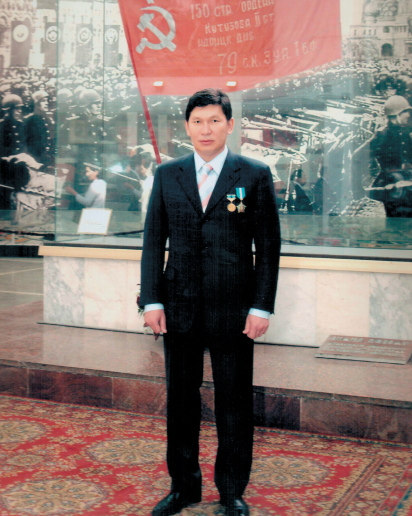 July 2000, Atyrau
July 2000, AtyrauSo the idea had, in principle, been prepared by the previous exploratory work and, as they say, was in the air. Analysis of the documents confirmed the potential of the prospecting operations. The political situation of the day also favoured the taking of a decision, all that was needed was the will and determination, which was actually displayed by the country’s leadership.
In such difficult conditions of general collapse and lack of funds, how was it possible to attract investment for prospecting on the Caspian shelf?
At the end of 1992 a comprehensive programme for geophysical exploration of the Kazakh sector of the Caspian was approved, designed for the period 1993-97. Several ministers were put to work at once and they started talks with foreign partners. At that time I was working in the Ministry of Foreign Economic Activity under the leadership of Syzdyk Abishev, as head of the department of hydrocarbons and petrochemicals, taking a direct part in the search for foreign investors in the Caspian. In the end, the country’s leadership decided to make this work more systematic and transfer jurisdiction to the Ministry of Energy and Fuel Resources, which was headed by Kadyr Baikenov. In 1993 he invited me to work in his ministry as head of offshore operations.
The first conversation that took place in his office passed off in quite an informal atmosphere. Kadyr Baikenov not only took an interest in my professional experience, but also listened carefully to my vision and my advice, and he invited the outstanding specialist Baltabek Kuandykov, an experienced oil expert who at that time held the post of deputy minister of geology. At that time I had already known him for about two years.
I have to say that we put together a very tight-knit team not just of like-minded people, but also enthusiasts and top-class specialists. We were united by a common idea which led to the creation in the ministry of a specialized state company KazakhstanCaspiyShelf (KCS). Its remit included attracting investment for the project. Baltabek Kuandykov, who had recently been appointed to the post of deputy minister of energy and fuel resources, became its president, and I became deputy president. We started from scratch in the fullest sense.
The state programme for the development of the Caspian was getting under way in almost Spartan conditions: from the three small offices in which the entire work was concentrated. We were the first to start talks with Western companies to attract them to the Caspian, and we laid the foundations for the creation of an international consortium and for offshore geophysical exploration. We slowly formed a team of specialists which made up the backbone of KCS.
Basically, it was Baltabek Mukhanovich and I that started the first negotiations, presentations and consultations. Gradually, other colleagues who had come to work at the company joined the process. Within the very short space of time from preliminary agreement to final signature, we had set out our negotiating position and drawn up a blueprint for the functioning of the international consortium for operations in the Caspian.
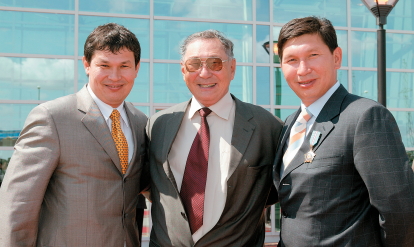 With father and brother
With father and brotherAt that time Kazakhstan was to some extent an “unknown quantity” for world business. It had emerged as a state on the political map of the world literally only a year previously, but in spite of this offers poured in almost from the outset, and moreover from companies of the first rank, so to speak. BP and Total were among the first to make offers. They were putting forward, in their opinion, very attractive terms, offering our country any blocs in any part of the world, and at the same time promising full investment for the development of the North Caspian project, including payment of the relevant portion of the Kazakh company’s outlays.
But having studied the offers, we came to the conclusion: we must not hand the project to just one investor, however influential a country it represented, however authoritative, experienced and worthy it might be. After all, besides the actual prospecting of the shelf, we had another objective: we had to construct and develop our own national offshore oil and gas company and gain experience in offshore operations, which we could only gain by taking on board the strong points of players of various calibers and various business philosophies.
There was a clear understanding – the young republic needed its own offshore oil prospecting company, which had to be created and put into effect within the shortest possible time. And so the decision emerged: to form an international consortium, and one moreover with various participants – both European and American.
As I recall that time I can say without exaggeration that we received offers from several dozen companies. But we had to choose no more than five or six of the strongest. Talks went on virtually day and night, with one contender replacing another.
The point of departure for the negotiating process was the selection criterion which we had made clear at the very outset: a wealth of experience of working in an ecologically sensitive offshore zone in conditions similar to those in the North Caspian, and a readiness to make the investments which were so necessary to the young republic and which had to go towards financing the launch of prospecting operations on the shelf.
Some of the contenders dropped out themselves during the negotiations, while we dropped others, some didn’t like the financial terms, and as a result the international consortium was formed. It included the following companies: Shell (Netherlands), Mobil (USA), ENI (Italy), British Gas (UK), Total (France), and also jointly Statoil (Norway) and BP (UK). The seventh full member of the consortium was our own state company KCS.
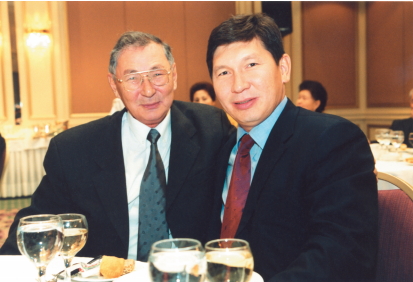 With father
With fatherThe agreement on the creation of the consortium, which was given the name of the Kazakh company designated to carry out the prospecting work on the Caspian shelf, was signed on 3rd December 1993. The consortium had the following objectives: completion by 1997 of a programme of exploratory operations in the Kazakh sector of the Caspian, the training of local personnel in Western management techniques, and also the training of Kazakh specialists who would be able to continue work subsequently on other offshore projects.
Recalling that time, I would like to say that the first stage of developing the consortium was quite difficult, as you would expect. As in any collective, especially one that is multinational, multicultural and multilingual, there was an adjustment period: it’s not easy managing a process when you have in one team so many people with different philosophies, agendas and even mentalities. But in spite of this we managed to overcome all the difficulties and finally create a company which could serve as a foundation for the establishment and development of offshore oil production in Kazakhstan.
Just recently veterans of the industry met in Almaty to mark the 20th anniversary of the company KCS. In spite of its relatively young age, our national offshore oil industry has gained a wealth of experience, the foundation of which was provided by the unprecedented geophysical prospecting operations in the Kazakh sector of the Caspian. As a result of the seismic research, we have discovered dozens of promising oil- and gas-bearing deposits, the development of which has become the locomotive for the effective growth of Kazakhstan’s economy. It is nice to acknowledge my involvement in the results of these 20 years of work.
Up until then Kazakhstan has had no experience of offshore development. Naturally, as with any new thing, there were both supporters and opponents of the project



